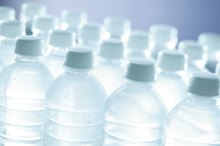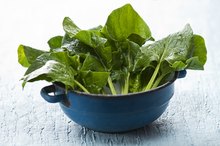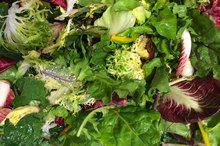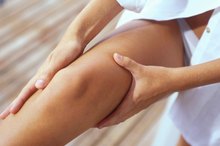Nutrients That Regulate Body Temperature
The human body maintains a consistent core temperature between 98 and 100 degrees Fahrenheit, and it requires certain nutrients, including water and magnesium, to maintain this healthy temperature. Dehydration can hinder the body’s ability to maintain a safe temperature.
Water
Water accounts for about 60 percent of your body weight and plays an essential role in body temperature regulation as well as waste removal and the lubrication and protection of joints, tissues and the spinal cord. The evaporation of sweat from the body’s surfaces helps to cool the body during hot weather and physical activity. When your body loses too much fluid, you become dehydrated, which can lead to heat intolerance, light-headedness, fatigue, flushed skin and loss of appetite. Severe dehydration can be fatal.
- Water accounts for about 60 percent of your body weight and plays an essential role in body temperature regulation as well as waste removal and the lubrication and protection of joints, tissues and the spinal cord.
- The evaporation of sweat from the body’s surfaces helps to cool the body during hot weather and physical activity.
Drink Up!
Nutrition Facts of Dasani Water
Learn More
The Institute of Medicine recommends that men drink about 13 cups of beverages per day and women about 9 cups. Drink water with every meal and whenever you feel thirsty. Drink at least two cups of water one to two hours before exercising outdoors, suggests the Cleveland Clinic, and drink 5 to 10 additional ounces of water for every 10 to 15 minutes you spend outside.
Magnesium
Magnesium, the fourth most abundant mineral in the body, plays an important role in a variety of body functions, including energy metabolism, protein synthesis and blood sugar and blood pressure regulation. Magnesium also plays a role in regulating body temperature.
Magnesium Sources and Intake
The Amount of Calcium and Magnesium for a 70-Year-Old Woman
Learn More
Recommended magnesium intake varies according to age and gender. Males age 14 to 18 should get 410 milligrams per day, those age 19 to 30 should get 400 milligrams per day and men over 30 should get 420 milligrams per day, according to the National Institutes of Health Office of Dietary Supplements. Females age 14 to 18 should get 360 milligrams per day, those ages 19 to 30 should get 310 milligrams per day and women over 30 should get 320 milligrams per day. Food sources of magnesium include almonds, cashews, soybeans, spinach, fortified oatmeal, potatoes, peanuts, legumes, wheat bran, wheat germ, brown rice and avocados.
- Recommended magnesium intake varies according to age and gender.
- Males age 14 to 18 should get 410 milligrams per day, those age 19 to 30 should get 400 milligrams per day and men over 30 should get 420 milligrams per day, according to the National Institutes of Health Office of Dietary Supplements.
Related Articles
References
Writer Bio
Lisa Porter began writing professionally in 2009. She writes for various websites and has a Bachelor of Arts in English literature.









